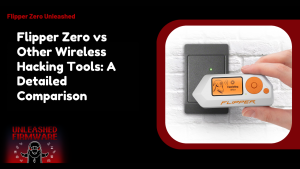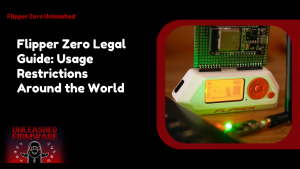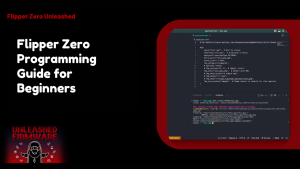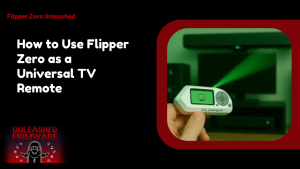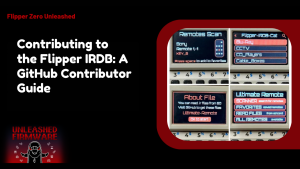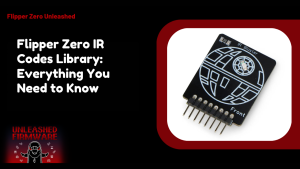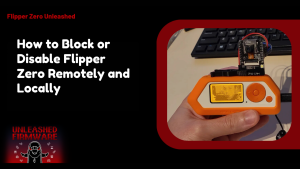Table of Contents
ToggleIntroduction
If you’ve just discovered the magic of the Flipper Zero, you’re probably curious about its infrared powers. Think of IR files as small instruction sets that enable your gadget to communicate with TVs, air conditioners, and other remote devices.
Once You organize IR files, you can quickly expand the capabilities of your device. The best part? Downloading these files is easy and provides instant access to a vast collection of ready-to-use codes.
What IR Files Mean for Flipper Zero
So, what’s the big deal with IR files? These files are like a digital version of your remote’s buttons. When loaded into the Flipper Zero IR database, they tell your Flipper exactly how to mimic those signals. That means you don’t need to carry five different remotes anymore, your Flipper has them all tucked inside. For beginners, IR files save a ton of time.
How IR Files Work with Flipper Zero
Here’s how it all comes together: your Flipper Zero uses its infrared module to “speak” to devices. The Flipper Zero IRDB acts as a library where all those signals are stored neatly in file format. When you select a code from the Flipper Zero IR database the Flipper sends that exact signal to your TV or device. This smooth process is why IR files are so popular. They make the Flipper more versatile, allowing you to set up universal remote functions in just minutes. With a little organization, you can switch between devices without skipping a beat.
Benefits of Using Organized IR Libraries
Now here’s the fun part: organizing your IR files. Having a tidy library makes life so much easier. Imagine searching for your TV codes only to find them buried in a messy folder. No thanks! By keeping your IRDB flipper files sorted you’ll always know where everything is. An organized setup also means faster control, fewer errors and more reliable performance. Plus with an updated flipper zero IR database you’ll never have to worry about missing codes when you want to impress your friends with your all-in-one gadget.
Sources for Downloading IR Files
When it comes to expanding the functionality of your Flipper Zero, knowing where to obtain the correct IR files is crucial. The good news is that the community has developed numerous resources to make this process easier. Whether you’re exploring the flipper IRDB or hunting through trusted community hubs, you’ll find an endless library of codes ready to try out.
Official Repositories and Community Databases
Your first stop should always be official repositories, especially those directly connected to the Flipper Zero IRDB project. These are well-maintained, frequently updated, and regularly reviewed by other contributors, ensuring the files are clean and accurate. GitHub is the go-to, with the central IRDB flipper repository offering a vast variety of pre-tested code that works right out of the box. Community databases are another fantastic option.
Safe Third-Party Websites
While downloading from third-party websites may sound risky, some are safe and well-known in the Flipper IRDB space. These sites often curate IR code collections in neat categories, making it extremely easy to grab what you need without having to dig through endless folders. Be sure to double-check reviews and avoid suspicious links. Stick to websites that the community itself recommends. Many users share their favorite trusted third-party sites on forums or Discord groups.
User-Contributed IR Libraries
Some of the most creative finds come straight from user-contributed libraries. These are shared collections from Flipper Zero owners who upload custom codes they’ve captured themselves. The best part? These files often cover niche or unusual devices that you won’t see in the IRDB Flipper repositories. It’s also a fun way to give back to the community. If you’ve recorded your codes, you can share them so others benefit too.
Methods to Download IR Files
Getting IR files onto your Flipper Zero doesn’t have to be tricky. There are several ways you can pull files from the flipper IRDB or other sources and each method works depending on what’s most convenient for you. Whether you like quick mobile syncing, going old-school with your computer, or browsing GitHub directly, there’s a smooth way to do it.
Direct Download via GitHub or Websites
The simplest way to obtain IR files is through GitHub, where the community actively updates the Flipper Zero IR database. You can head straight to the repository, download the ZIP file, and extract it on your computer. From there it’s just a matter of copying it over to your Flipper Zero. If GitHub feels overwhelming don’t worry many trusted websites also mirror IR collections for easy download. Just be sure the source is reliable since corrupted or mislabeled files can cause issues when loading into your IRDB flipper setup.
Syncing Files Through the Flipper Mobile App
If you prefer convenience, the Flipper Mobile App is your best friend. With just a few taps, you can connect your Flipper Zero and pull files directly from the Flipper Zero IRDB without touching your computer. This method is ideal for quick updates or when testing new code on the go. The app also makes it easier to stay synced with the latest community contributions. Think of it as carrying the Flipper Zero IR database right in your pocket always ready to push files directly to your device.
Manual Transfer from Computer to Device
For individuals who prefer complete control, the manual method is the best option. You download IR files from GitHub or other sources onto your computer, then connect your Flipper Zero via USB. Once connected, you simply drag and drop files into the correct folder. This way you know exactly where your files are stored and can organize them however you like. Many users prefer this option when handling extensive IR collections as it allows you to carefully curate your IRDB flipper setup without clutter.
Organizing IR Files on Flipper Zero
Once you’ve downloaded your IR files, the real magic happens when you keep them neat on your device. A cluttered setup can make it tough to find the correct code when you need it most. By structuring your Flipper Zero IRDB properly you’ll save time and avoid the frustration of scrolling through endless files. The Flipper Zero IR database is robust, but it works best when everything is easy to navigate.
Creating Folders for Easy Access
Folders are your best tool for keeping things under control. Instead of dumping all codes into one space, you can create separate folders for TVs AC units projectors or any other category you need. This makes it quick to browse when using the IRDB flipper on the go. Think of it like organizing your closet – you wouldn’t toss all your clothes into one pile right? Keeping IR files in folders ensures your flipper IRDB is always ready when you need it, whether at home or helping a friend.
Naming Conventions for Stored Files
Names matter more than you think. Instead of leaving files with random or cryptic labels, rename them with clear and descriptive labels. A file called Sony_TV_Power.ir is much easier to identify than a file with a generic name like file123.ir. By sticking to a simple naming system, you’ll never waste time guessing. This also helps when sharing your codes with others in the Flipper Zero IRDB community, since they’ll instantly know what each file is for.
Grouping Files by Device Type or Brand
Another clever trick is to sort files by brand or device type. All Samsung TV codes in one folder, all LG AC codes in another, you get the idea. This way your Flipper Zero IR database remains organized regardless of its size. Grouping by brand also makes troubleshooting easier. If one remote doesn’t work, you can quickly try another file from the same folder without searching through unrelated devices. It’s a smart way to make your IRDB flipper library both practical and efficient.
Tips for Managing Large IR Collections
If you’ve been experimenting with different remotes, chances are your Flipper Zero IR Database is growing quickly. Managing an extensive collection doesn’t have to feel overwhelming. With a little organization and the proper storage methods, your IR files will always be easy to find, safe, and readily available for use. A clean setup means fewer headaches later.
Backing Up Your IR Files
One of the best habits you can build is regularly backing up your IR codes. Your Flipper IRDB is a valuable resource, especially if you’ve spent time learning and saving custom signals. By copying your files to a computer, USB drive or even syncing with an external storage option, you’ll always have a safety net if something happens to your device. A backup doesn’t just protect against accidental deletion; it also saves you from potential firmware resets or corrupted files.
Using Cloud Storage for Extra Safety
Cloud services are perfect for keeping your Flipper Zero IRDB collection safe and accessible. Whether you use Google Drive, Dropbox, or another platform, storing your IR codes online means you can grab them anytime, from anywhere. Additionally, it’s a convenient way to share files with friends or sync them across multiple devices. Uploading your IRDB Flipper files to the cloud also protects against device loss or failure.
Avoiding Duplicate or Corrupted Files
When handling big libraries, duplicates are almost unavoidable unless you stay organized. Create clear folder structures within your Flipper Zero IR Database so each device type has its own space. Label codes with names that make sense, like LivingRoom_TV instead of something vague. Corrupted files can also sneak in, especially when transferring or editing code. To avoid this always double-check files after moving them and test them on your Flipper before deleting the originals.
Troubleshooting IR File Issues
Even the most organized Flipper Zero IRDB setup can encounter minor issues. Sometimes files won’t download correctly, or a saved code won’t work the way you expect. Don’t worry, most problems are easy to fix with just a few quick checks. Think of it like giving your IRDB Flipper library a quick tune-up. By learning how to spot and resolve common issues, you’ll keep your IR codes running smoothly without losing hours of frustration.
Fixing Broken or Incomplete Downloads
A half-downloaded IR file is one of the most common headaches. If you notice a file is missing parts or won’t open, try downloading it again using a stable connection. Avoid using public Wi-Fi for big transfers as interruptions can easily corrupt your files. It’s also a good idea to compare the new file with your existing Flipper Zero IR Database to ensure there aren’t any duplicates. This keeps your library clean and prevents confusion later when testing codes.
Handling Files That Don’t Work on Flipper Zero
Sometimes a code may appear to be working correctly but still refuses to function on your device. This usually means the signal wasn’t captured correctly or isn’t supported by the Flipper Zero IRDB. Before deleting the test on different devices, it may still work elsewhere. If the problem continues, re-capture the IR signal and save it again with a clear name. Many users also share working files in the Flipper Zero IR Database community, so checking those can save you time.
Updating IR Files to Match Firmware
Every once in a while, your Flipper’s firmware changes how it reads IR files. If your old codes suddenly stop working, they may just need updating. Always keep your device updated to ensure your Flipper IRDB remains compatible. When updating firmware double-check your stored codes by testing them to ensure accuracy. If any fail, replace them with newer versions from the community or re-capture the signal. A quick refresh ensures your IRDB Flipper stays in sync with the latest features.
Safety and Best Practices
When working with IR files, it’s always better to stay safe than sorry. Downloading from random sources can sometimes cause errors or even break your setup. Always choose files from trusted repositories or well-known Flipper Zero IRDB communities. This way, you know the codes are clean, tested, and won’t mess up your device.
Ensuring Files Come from Trusted Sources
When downloading IR files, always grab them from official or verified sources. Random
websites may host corrupted or unsafe files that could mess up your Flipper Zero IR Database. Sticking to trusted repositories like Flipper IRDB or the official community ensures that your code is safe and reliable. It’s like choosing fresh ingredients for a recipe. Your device works better when the source is clean and secure. Double-check the uploader’s reputation and reviews before adding anything to your IRDB Flipper library.
Keeping Firmware and Apps Updated
Keeping your Flipper Zero firmware and companion apps up to date is key. Updates often fix bugs, improve compatibility, and ensure your Flipper Zero IRDB works flawlessly with new IR files. Set reminders to check for updates regularly. This way your IR codes stay compatible, and you can avoid frustrating errors when using your Flipper Zero IR Database. It’s a simple step that saves a ton of troubleshooting later.
Regularly Cleaning and Organizing Libraries
A tidy library makes life so much easier! Periodically review your stored IR files, delete duplicates, and rename codes clearly to ensure accuracy. A clean IRDB Flipper library helps you quickly find the code you need without frustration. Organizing also prevents accidental overwrites and keeps your flipper irdb efficient. Think of it like Marie Kondo-ing your digital IR collection. Everything has a place, and everything works better when it’s organized.
Conclusion
Managing your IR files for Flipper Zero doesn’t have to be tricky! By downloading from trusted sources, keeping your firmware and apps updated, and regularly cleaning and organizing your library, you ensure that your Flipper Zero IR database stays safe, efficient and easy to use. With these simple steps your flipper IRDB will be ready for smooth reliable control of all your IR devices.
FAQs
Where can I download IR files for Flipper Zero?
You can grab IR files from official sources like the Flipper Zero IR Database or trusted community repositories. Popular platforms like GitHub also host verified Flipper IRDB files, so you know you’re getting safe and working code.
Can I create my own IR files instead of downloading them?
Absolutely! Capturing your signals is simple using the Flipper Zero’s infrared module. Once saved, you can organize them in your Flipper Zero IRDB for easy access later. This is perfect if your device or remote isn’t already in the database.
How do I import downloaded IR files to my Flipper Zero?
After downloading, connect your Flipper Zero to your computer or smartphone. Transfer the IR files into the Flipper Zero IR database folder, and they’ll be ready to use. Double-check the file names to avoid duplicates and confusion.
What should I do if a downloaded IR file doesn’t work?
First, ensure that your device’s firmware is up to date. If the file still fails, try re-downloading it from a trusted IRDB flipper source or recapturing the IR signal yourself. Sometimes a small error during download can make the code unusable.
How can I organize IR files for faster access?
Create folders by device type brand or room for a cleaner Flipper Zero IR Database. Adding clear names and version numbers helps you quickly locate the correct file especially as your collection grows larger.
Is it safe to use community-shared IR files?
Most community files are safe, but always download from verified sources or the official Flipper IRDB repositories. Avoid random or suspicious links to keep your Flipper Zero secure and your IR codes reliable.
Latest post:



